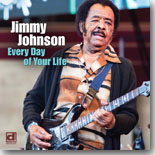 Since I started listening to the blues,
Jimmy
Johnson has been one of my favorite artists.
Ever since I heard his two Delmark albums
(Johnson’s Whacks and North/South) and his
Alligator release (Bar Room Preacher, a reissued
version of his French release Heap See), I’ve
been a fan of his distinctive guitar and vocals
and his fearlessness at incorporating other
genres into his already-unique brand of blues.
The fact that he’s still active and vital at the
age of 91 is a real treat for blues fans, and
it’s been great to see him performing on Facebook on a regular basis (he even took a
minute to wish my wife a happy birthday a few
weeks ago).
Since I started listening to the blues,
Jimmy
Johnson has been one of my favorite artists.
Ever since I heard his two Delmark albums
(Johnson’s Whacks and North/South) and his
Alligator release (Bar Room Preacher, a reissued
version of his French release Heap See), I’ve
been a fan of his distinctive guitar and vocals
and his fearlessness at incorporating other
genres into his already-unique brand of blues.
The fact that he’s still active and vital at the
age of 91 is a real treat for blues fans, and
it’s been great to see him performing on Facebook on a regular basis (he even took a
minute to wish my wife a happy birthday a few
weeks ago).
Johnson released Every Day Of Your Life (Delmark
Records) just a couple of weeks after his 91st
birthday, but truthfully, listening to the album
wouldn’t give you a clue as to his age. The nine
tracks include five originals from Johnson,
along with four choice cover tunes, and he’s
backed by two top notch bands, with Rico McFarland
(guitar), Roosevelt Purifoy (piano/organ), J.R.
Fuller (bass), Pooky Styx (drums) on four tracks,
and Brother John Kattke (keys/guitar), Curt
Bley (bass), Ernie Adams (drums) on four tracks.
The familiar sounds of Johnson’s guitar work
will bring a smile to the faces of his fans as
they introduce the title track, which opens the
disc. This original has a sage message --- to live
every day as if it’s your last --- and Johnson’s
high tenor is as welcome as his guitar work. Purifoy gets an extended solo on B3 and
Johnson’s vocal is complemented by Typhanie
Monique’s gospel-inflected backing vocals.
Johnson also smoothly covers B.B. King’s “I Need
You So Bad,” his guitar work taking a bit of a
cue from King’s own style, but still retaining
that characteristic Johnson feel.
Johnson originally recorded the bittersweet “My
Ring” on his mid-’90s album I’m A Jockey. This
version adopts a funky reggae rhythm that proves
the guitarist is still not afraid to take risks
with his music. The menacing “Rattlesnake” is a
great new original, with Johnson serving notice
to a rival for his woman’s affections and
serving up a tasty guitar solo in the process.
Fenton Robinson’s “Somebody Loan Me A Dime” is
done about as well as possible, Johnson’s vocal
effectively conveying the pain and suffering
present in the lyrics.
The upbeat, swinging “Down In The Valley” is
another classy Johnson original that makes the
best of a tough situation, and Percy Mayfield’s
“Strange Things Happening” gets a terrific slow
blues treatment with ample opportunity for
Johnson and Purifoy to strut their instrumental
stuff. The instrumental “Better When It’s Wet”
is Johnson on the jazzy side with stellar
support from Kattke on B3.
The album closes with a solo track
as Johnson
sings the Bobby “Blue” Bland classic, “Lead Me
On,” accompanying himself on piano. It’s an
amazing performance, highlighting Johnson’s
soulful vocals and his underrated skills on
keyboard and wrapping the disc up perfectly.
Jimmy Johnson sounds like a man who’s not ready
to ride off into the sunset. Based on what’s
heard on Every Day Of Your Life, it sounds like
the 91-year-old has a lot more to offer blues
fans, and that is a gift we should all savor.
--- Graham Clarke
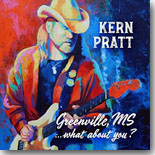 I regret that I didn’t get an opportunity to
listen to Greenville, MS…What About You?
(Endless Blues Records) from Kern Pratt until
after the end of last year, because I surely
would have found a place for it on my Top Ten
list. I really enjoyed his 2015 release, Broken
Chains, a lot and this one is even better.
I regret that I didn’t get an opportunity to
listen to Greenville, MS…What About You?
(Endless Blues Records) from Kern Pratt until
after the end of last year, because I surely
would have found a place for it on my Top Ten
list. I really enjoyed his 2015 release, Broken
Chains, a lot and this one is even better.
Pratt
(vocals/guitar) offers ten excellent tracks,
three of them originals, and surrounds himself
with a host of talented musicians who provide
superlative backing throughout, among them Bob
Dowell, who produced the album and played bass,
keyboards, trombone and guitar, guitarists Jeff
Jensen and Chris Gill, and Gregg Allman’s horn
section (Marc Franklin and Kris Jensen).
The opening track is a simmering pot of southern
funk, “Loving That Feeling,” where Pratt has a
great time recalling a good time from the past,
backed by Gill’s slide guitar. The soulful “Hard
Working Man” features keyboards from Nelson
Blanchard (of Louisiana’s LeRoux) and Muscle
Shoals legend Clayton Ivey.
Mick Kolassa
contributed the poignant slow blues, “Baby’s Got
Another Lover,” about dealing with a lover’s
drug addiction. Pratt’s work on vocals and
guitar is heartfelt and pitch perfect on this
track. The mid-tempo soul-blues “Torn Between
Love And Hate” features Pratt’s clean and crisp
guitar work.
Another splendid slow burner, “Something’s Gone
Wrong,” was crafted after an argument between
Pratt and his lady. This argument paid off with
a good song, and Pratt adds some cool B.B.
King-inspired guitar to go with his frustrated
vocal. Singer Denise Owen joins Pratt on Larry
Van Loon’s “Rita,” a sober ballad that addresses
addiction. The upbeat “Way She Wears Her
Clothes” picks up the mood considerably, Owen
takes the mic for the second-line-funky “NOLA,”
while “Whatcha Gonna Do” gives Pratt ample space
to shine on guitar.
The album closes with a down-and-dirty take on
Bobby Rush’s “Chicken Heads,” a song that never
gets old to these ears. Pratt is joined by Jeff
Jensen on guitar for this wonderful cover.
Pratt grew up in Greenville, right in the middle
of the Mississippi blues scene. He met many of
the area’s blues legends as they shopped in his
dad’s hardware store and became immersed in
their music at a very young age. It’s obvious
from listening to Greenville, MS…What About You?
that he learned his lessons well. Don’t let this
one slip by you.
--- Graham Clarke
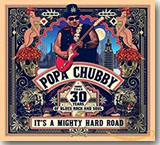 t’s hard to believe, but it’s been over 30
years since Popa Chubby (a.k.a. Ted Horowitz)
has been crafting his trademark brand of blues,
funk, and rock. It’s A Mighty Hard Road (Popa
Chubby Productions) celebrates those 30 years
with an outstanding new set of 13
originals and two cool covers. As usual, Chubby
provides all the original songs and vocals as
well as
the lion’s share of the instrumentation
(guitars, bass, keys, drums, harmonica) with
assistance on all tracks from keyboardist Dave
Keyes, plus contributions from Steve Holley and
Don Castagno (drums), and Brett Bass and V.D.
King (bass).
t’s hard to believe, but it’s been over 30
years since Popa Chubby (a.k.a. Ted Horowitz)
has been crafting his trademark brand of blues,
funk, and rock. It’s A Mighty Hard Road (Popa
Chubby Productions) celebrates those 30 years
with an outstanding new set of 13
originals and two cool covers. As usual, Chubby
provides all the original songs and vocals as
well as
the lion’s share of the instrumentation
(guitars, bass, keys, drums, harmonica) with
assistance on all tracks from keyboardist Dave
Keyes, plus contributions from Steve Holley and
Don Castagno (drums), and Brett Bass and V.D.
King (bass).
The tasty (literally) shuffle, “The Flavor In
The Fat,” kicks off this entertaining disc and
doubtlessly serves as a mission statement of
sorts for Chubby’s life and his musical
approach. The title track is next, a certain
crowd-pleasing blues rocker, followed by “Buyer
Beware,” an R&B-flavored blues. On the roadhouse
rocker “It Ain’t Nothin’,” Chubby breaks out the
slide to great effect before smoothly transitioning
to the soulful ballad. “Let Love Free The Day,”
and then blasts the doors off on the fiery
rocker “If You’re Looking For Trouble.”
“The Best Is Yet To Come” is another mellow
ballad, with Chubby’s vocals, speaking
encouragement working well in this format. “I’m
The Beast From The East” is a storming blues/rock number loaded with swagger, the mellow
instrumental “Gordito” has a distinctive Latin
influence and shows Chubby’s versatility on
guitar, and “Enough Is Enough” deftly mixes
funk, blues, and rock. “More Time Making Love”
is a tough straight-forward rock ‘n roller, “Why
You Wanna Bite My Bones” is a two-fisted
churning boogie, and “Lost Again” is a smoky
after-hours blues/jazz ballad.
The album concludes with the two covers. Leon
Russell’s “I’d Rather Be Blind” features a
passionate vocal turn from Chubby with guitar
work that would make Freddie King smile, and the
raucous closer, Prince’s “Kiss,” is just
first-rate, transformed from slippery funk to
gritty blues. Based on Chubby’s no-holds-barred
performance vocally and instrumentally, this
song is a favorite of his.
If you’re a fan of Popa Chubby’s, you already
have It’s A Mighty Hard Road. But if you’re a
newcomer to his exciting mix of blues, rock,
funk, and soul, this is a great place to get
started. Can’t wait for the next 30 years!
--- Graham Clarke
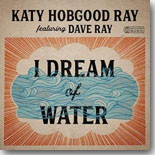 Katy Hobgood Ray is probably best known for her
work in children’s music in New Orleans, but I
first heard her singing with Steve Howell on his
Good As I’ve Been To You album a few years back.
Currently residing in Memphis, she recently
issued I Dream Of Water on Howell’s Out of the
Past Music label, teaming with her husband and
musical partner Dave Ray. The album features ten
tracks of blues and folk music, nine originals
from the couple, which deal with the horrors of
Katrina and its aftermath.
Katy Hobgood Ray is probably best known for her
work in children’s music in New Orleans, but I
first heard her singing with Steve Howell on his
Good As I’ve Been To You album a few years back.
Currently residing in Memphis, she recently
issued I Dream Of Water on Howell’s Out of the
Past Music label, teaming with her husband and
musical partner Dave Ray. The album features ten
tracks of blues and folk music, nine originals
from the couple, which deal with the horrors of
Katrina and its aftermath.
The gentle opening track, “Lollie Bottoms,” has
a light, lilting feel that belies the serious
tone of the lyrics…an old levee that struggles
to keep the river at bay. The gospel-flavored
“Washed Away” laments those who were lost by the
levees that didn’t hold, and “Oh Devil” is a
funky shuffle with gritty slide guitar from Greg
Spradlin. The title track has an atmospheric
feel, almost like those Daniel Lanois-produced
albums of the late ’80s, as Ms. Ray recounts her
constant fear of living so near to the constant
danger of flooding. “House Divided” features the
Rays together on a tune that could be about a
relationship or the current state of affairs in
the country.
The somber “Dirty Water” reflects on the effects
of Katrina on the city --- what’s changed and what
hasn’t --- and the album’s cover, Leadbelly’s
“Little Children’s Blues,” is a fine tribute to
the legendary musician (the Rays are members of
Friends of Leadbelly, a group of artists
dedicated to promoting his musical legacy).
“Des Allemands” is a swampy reminiscence of traveling
to a family reunion, with vivid imagery that will
bring a smile to those raised in small towns.
Dave Ray takes the mic for “That Really
Matters,” a charming blues lesson that everyone
should apply to their own lives.
The closer, “Kings, Queens, and Jesters,” finds
Katy encouraging all to live for the moment and be
positive through all the negativity that life
brings. It’s a good lesson to take from a pair
who have experienced both good and bad, as most
of us have at one time or another. I Dream Of
Water will resonate to anyone who’s bounced back
from personal struggles of any kind.
--- Graham Clarke
 Peace In Pieces fulfills a lifelong dream for
Betty Fox. The Florida-based singer has always
wanted to record at Fame Recording Studios in
Muscle Shoals, where many of her favorite
singers also recorded. She’s joined by the
legendary Spooner Oldham on the Wurlitzer,
Clayton Ivey on organ and piano, and the Fame
horn section (Brad Guin – sax, Ken Watters –
trumpet), along with guitarist Josh Nelms,
bassist Barry Williams, drummers Chris Peet and
Jake Winebrenner, and backup vocalists Cindy
Walker and Marie Lewey.
Peace In Pieces fulfills a lifelong dream for
Betty Fox. The Florida-based singer has always
wanted to record at Fame Recording Studios in
Muscle Shoals, where many of her favorite
singers also recorded. She’s joined by the
legendary Spooner Oldham on the Wurlitzer,
Clayton Ivey on organ and piano, and the Fame
horn section (Brad Guin – sax, Ken Watters –
trumpet), along with guitarist Josh Nelms,
bassist Barry Williams, drummers Chris Peet and
Jake Winebrenner, and backup vocalists Cindy
Walker and Marie Lewey.
The opening track, “Green Light,” is
gospel-flavored soul and Fox really blows the
doors off, getting the disc off to a rousing
start. “Winter’s Cold," “Marie,” and “Sweet
Memories” all dig deep into that southern soul
vein, the Fame horns add to the feel, sounding
like they could have easily been released some
50 years ago.
The lively title track picks up
the pace a bit, mixing a little funk in with the
soul and also features a crisp guitar solo from Nelms. Meanwhile, the interesting “Let Go Or Be
Dragged” really puts Fox’s vocal range on
display in a stirring performance.
“Runnin’ Back To You” is a splendid slow burning
blues ballad, “Feels So Good” is a catchy upbeat
slice of pop and soul, while the poignant “Sweet
Goodnight” is an autobiographical track
co-written by Fox with her stepmother for her
father, who passed away from Lou Gehrig’s
disease. Fox’s emotional performance will induce
goose bumps.
The laid-back “Magnificent
Hallucination” is a haunting tune with a steamy
vocal, and “Shattered Dreams & Broken Toes,”
another track that sounds close enough to home
to be autobiographical, has a sultry Latin feel.
“Rising Strong” is a heady mix of jump blues and
jazz with a robust vocal from Fox, punchy horns,
and a strong guitar break from Nelms.
“Fireflies” is a bit of an outlier on the album,
with its earthy, Americana feel. This tune,
recorded in Largo, Florida, shows the soulful Fox to
be equally comfortable in the Americana format.
The album closes with a beautiful read of the
gospel classic, “’Til The Storm Passes By.”
Peace In Pieces is a stunning shot of soul,
blues, and gospel from the Betty Fox Band. Fox
has an amazing voice and is a gifted songwriter
backed by a most excellent band. If you’re a fan
of soul the way it used to be played, put this
one on your “must buy” list. You can thank me
later.
--- Graham Clarke
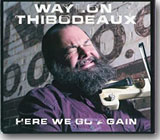 Louisiana’s Rockin’ Fiddler
Waylon Thibodeaux
decided to explore his blues side on his third
release for Rabadash Records, Here We Go Again. Rabadash owner and album producer, John Autin,
calls it “blues with a Cajun accent. Thibodeaux
delivers ten songs, with five impressive
originals and a far-ranging set of covers
teaming the fiddler with a host of guest artists
that includes Autin (who plays keyboards),
guitarist Josh Garrett, harmonica ace Johnny
Sansone, and bassist Benny Turner. The set list
not only touches on the blues, but also cajun,
rock, country, and swamp pop.
Louisiana’s Rockin’ Fiddler
Waylon Thibodeaux
decided to explore his blues side on his third
release for Rabadash Records, Here We Go Again. Rabadash owner and album producer, John Autin,
calls it “blues with a Cajun accent. Thibodeaux
delivers ten songs, with five impressive
originals and a far-ranging set of covers
teaming the fiddler with a host of guest artists
that includes Autin (who plays keyboards),
guitarist Josh Garrett, harmonica ace Johnny
Sansone, and bassist Benny Turner. The set list
not only touches on the blues, but also cajun,
rock, country, and swamp pop.
Thibodeaux’s originals include the catchy title
track, which opens the disc, the funky “I’m
Stuck With The Blues Again,” which features
Turner on bass, and “Our Life’s Another Blues Song,” sounding like a long-lost
swamp pop classic.
“Don’t You Make Me Put My Fiddle Down” is a slow
blues where the fiddler pulls out all the stops
by
using an effects pedal in creating a variety of
sounds from birds to a person weeping and
laughing to a train whistle, and the rocking
“Smoke Signals” tells a story about cruising the bar
with a twist.
The covers include a tasty read of the late
David Egan’s “Fail Fail Fail,” the country
rocker “When Love Comes Back,” an obscure gem
from Thibodeaux’s friend Doc Heart, a spirited
take of J.J. Cale’s “River Boat Song,”
introduced by the fiddle emulating a steam
whistle, Edgar Winter’s “Way Down South,” which
is given a fresh coat of paint with a lively
country feel, and a heartfelt version of Willie
Nelson’s “Funny How Time Slips Away” that closes
the album.
Thibodeaux’s fiddle playing is just marvelous
and never ceases to entertain, and his vocals
are warm and soulful, a fine fit for the diverse
set of tunes featured here. Here We Go Again
will satisfy any blues fan who also digs any of
the various styles of music heard in the Gulf
Coast region.
--- Graham Clarke
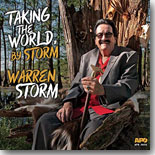 Warren Storm began his professional music career
at age 12, sitting in for his father who was
the drummer for the Cajun band Rayne-Bo
Ramblers. He eventually played with other combos
and became one of the most in-demand session
drummers in south Louisiana. He and his friend
Bobby Charles would travel to New Orleans to
listen to the local R&B groups and Storm soon
began to incorporate R&B and rock n’ roll into
his own group. In 1958 he recorded a single,
“The Prisoner’s Song,” an old country & western
tune (b/w “Mama, Mama, Mama”). Storm’s
combination of R&B, country, Cajun, and Creole
music paved the way for what would soon become
swamp pop, earning him the tag, “The Godfather
of Swamp Pop.”
Warren Storm began his professional music career
at age 12, sitting in for his father who was
the drummer for the Cajun band Rayne-Bo
Ramblers. He eventually played with other combos
and became one of the most in-demand session
drummers in south Louisiana. He and his friend
Bobby Charles would travel to New Orleans to
listen to the local R&B groups and Storm soon
began to incorporate R&B and rock n’ roll into
his own group. In 1958 he recorded a single,
“The Prisoner’s Song,” an old country & western
tune (b/w “Mama, Mama, Mama”). Storm’s
combination of R&B, country, Cajun, and Creole
music paved the way for what would soon become
swamp pop, earning him the tag, “The Godfather
of Swamp Pop.”
Singer Yvette Landry met Storm and struck up a
friendship, leading to her collaboration with
him on his biography, Taking The World, By
Storm. Sometime during the process, it was
suggested that one of Storm’s old recordings be
released to accompany the book. But since the
legend is still here, very active and sounding
as good at age 82 as he did in his salad days,
it was decided to just record a new album. The
album, also titled Taking The World, By Storm
(APO Records), was recorded at Dockside Studios
straight to two-track, live in the studio, just
like he used to do them in his early days.
The setlist includes 11 tracks, mostly songs
Storm has performed for years, songs like Earl
King’s “Lonely Nights,” Dave Bartholomew and
Fats Domino’s “Let The Four Winds Blow, Bobby
Charles’ “Tennessee Blues,” “Raining In My
Heart, Merle Haggard’s “My House of Memories,”
and the swamp pop anthem, “Mathilda.” Also
included are Storm’s first two songs “The
Prisoner’s Song” and “Mama, Mama, Mama.”
The opening track, Creedance
Clearwater Revival’s “Long As I Can See The
Light,” is new to his repertoire. However, John Fogerty and CCR’s
sound were heavily influenced by swamp pop, so
it seemed a wise choice, Storm does a
fantastic job with it, even sharing the final
verse of the song with Fogerty himself! Ms.
Landry joins Storm on “Mama, Mama, Mama,’
and Marc Broussard accompanies him on
“Mathilda.”
The core band on the session includes Eric
Adcock (piano), Roddie Romero (guitar), Gary
Usie (drums), Chris French (bass) and Derek
Huston (sax). Also appearing are longtime Storm
collaborator, Willie “Tee” Trahan (sax), as well
as Richard Comeaux (pedal steel), Beau Thomas (fiddle), and
Sonny Landreth (slide guitar).
Warren Storm has been making this kind of music
for over 70 years. At 82, he sounds as great as
he did in 1958. If you’re not familiar with the
man or swamp pop, Taking The World, By Storm is
a great place for new listeners to start, and
it’s a welcome addition to the genre for
longtime fans.
--- Graham Clarke
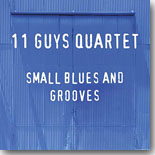 In the early 1980s drummer Chuck Purro,
bassist Bill “Coach” Mather, guitarist Paul
Lenart, and harmonica player (now VizzTone Label
Group president) Richard “Rosy” Rosenblatt got
together as the 11th Hour Band, playing the
blues in the clubs in and around Boston. They
released an album, Hot Time In The City
Tonight, on the Tone-Cool label in 1985 and played
together off and on for the next few years, more
as a side project to their other interests than
anything else. In 2008, the group reconvened and
decided to record an album of
instrumentals, mostly live takes, nothing fancy,
just the blues pure and unadorned.
In the early 1980s drummer Chuck Purro,
bassist Bill “Coach” Mather, guitarist Paul
Lenart, and harmonica player (now VizzTone Label
Group president) Richard “Rosy” Rosenblatt got
together as the 11th Hour Band, playing the
blues in the clubs in and around Boston. They
released an album, Hot Time In The City
Tonight, on the Tone-Cool label in 1985 and played
together off and on for the next few years, more
as a side project to their other interests than
anything else. In 2008, the group reconvened and
decided to record an album of
instrumentals, mostly live takes, nothing fancy,
just the blues pure and unadorned.
The album sat on the shelf until late last year,
when the group, now billed as the 11 Guys
Quartet, decided to release the album on VizzTone (they knew a guy).
Small Blues and
Grooves is just that, a great set of 14
straight-ahead traditional blues
instrumentals --- the very definition of a team
effort with all artists sharing the spotlight.
Each song is an original, composed by the team,
though all touch on themes that will be familiar
to most traditional blues fans and should make
it a most enjoyable listening experience for
them.
The opener is “Road Trippin’,” a lively shuffle,
and the uptempo “Jackrabbit” picks up the pace
from there. “Sweet Taste” slows things down a
slight bit with a dash of funk mixed in, and
“Doggin’ It” keeps the funk alive with some nice
fretwork from Lenart adding to Rosenblatt’s
sterling harp, which drives most of the tunes.
The laidback “Sleepless” is a relaxing front
porch track that moves at a casual pace, but
gives way to the hard-charging “East Cambridge
Cannonball.” Meanwhile, “Speakeasy Serenade” is
a leisurely, after-hours ballad, and “Four
Maypops” is a loping shuffle, while the slow
blues “Down And Dirty” percolates along nicely.
The briskly-paced “Swing Low” does just that,
and “Hey Daddyo” resurrects the irresistible Bo
Diddley beat.
The easygoing “Midnight Streetcar” is followed
by “Rhumba Boogaloo,” revisiting the classic
blues rhumba motif. The closer is “Swamp Ride,”
which ventures down to south Louisiana circa Excello Records days.
Small Blues and Grooves is fun to listen to from
beginning to end. Most listeners will just be
content to start it up and play it all the way
through, just taking in the great atmosphere
brought forth from the quartet. Truly a team
effort, the 11 Guys Quartet will surely satisfy
any fans of traditional blues in a big way.
--- Graham Clarke
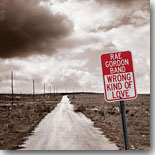 The Rae Gordon Band finished third at the 2017 I.B.C.,
with their previous album, Better Than I
Was, receiving notice on the blues charts in the
U.S., Canada, the U.K., and Australia, winning a
Muddy Award for Best Northwest Recording from
the Cascade Blues Association. The band (Gordon
– lead vocals, Allan Kalik – trumpet, Pat
McDougall – keyboards/vocals, Kivett Bednar –
guitar/vocals, Scott Franklin – saxophone, Ed
Pierce – drums, Joseph Conrad – bass) also won
the Best Contemporary Blues Act Muddy Award.
The Rae Gordon Band finished third at the 2017 I.B.C.,
with their previous album, Better Than I
Was, receiving notice on the blues charts in the
U.S., Canada, the U.K., and Australia, winning a
Muddy Award for Best Northwest Recording from
the Cascade Blues Association. The band (Gordon
– lead vocals, Allan Kalik – trumpet, Pat
McDougall – keyboards/vocals, Kivett Bednar –
guitar/vocals, Scott Franklin – saxophone, Ed
Pierce – drums, Joseph Conrad – bass) also won
the Best Contemporary Blues Act Muddy Award.
The band’s latest effort, Wrong Kind of Love,
boasts ten songs, with nine tunes written by the
band, which capture the band’s wide variety of
blues, soul, funk, and rock. The upbeat, sassy
“Comin’ Back For More” gets the disc off to a
rousing start, with funky fretwork from Bednar
and the horns blastting away behind Gordon’s
fiesty vocal. “Don’t Look Now” is mid-tempo,
with a bit of a New Orleans flair, thanks to the
horns, while “How You Gonna” is a poignant soul
track with a strong vocal from Gordon, The
energetic “Might As Well Be You” cranks things
back up to full speed.
Portland guitarist Rod Furlott penned the slow
burner “Sea of Blue,” which gives both McDougall and Bednar an opportunity to stretch out on
organ and guitar respectively. Gordon shines on
the former and then especially on the title track, a horn-fueled blues rocker. The
retro soul of “How Much I Love You” is a nice
touch and Gordon’s vocal is a keeper, the moody
“Got To Have You” has a smoky, after-hours feel,
and “Last Call” is a pretty cool “kiss-off”
song. The album closes with “Get Right With The
World,” a funky R&B-styled rocker.
The Rae Gordon Band seems to have the total
package --- great, smart songwriting, a gutsy and
soulful lead vocalist in Gordon, and a
first-rate, versatile band that easily handles a
variety of styles. Wrong Kind of Love is a great
fit for any blues fans who like a little bit of
soul and funk in the mix.
--- Graham Clarke
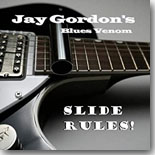 Jay Gordon and Blues Venom seldom disappoint
with their high-energy brand of electric blues
rock. Fans of the aforementioned style will find
much to savor on the guitarist’s latest gem,
Slide Rules! (Shuffle Music). Gordon’s fiery
slide guitar is unleashed on 13 powerhouse
tracks, including ten originals, and his attack
is backed by his rock solid rhythm section
(Sharon Butcher – bass/vocals, Tom Parham –
drums).
Jay Gordon and Blues Venom seldom disappoint
with their high-energy brand of electric blues
rock. Fans of the aforementioned style will find
much to savor on the guitarist’s latest gem,
Slide Rules! (Shuffle Music). Gordon’s fiery
slide guitar is unleashed on 13 powerhouse
tracks, including ten originals, and his attack
is backed by his rock solid rhythm section
(Sharon Butcher – bass/vocals, Tom Parham –
drums).
The opening track is “Dripping Blues,” a slow
burning, almost hypnotic track that slowly
builds in intensity with Gordon’s searing slide
front and center. “Pain” keeps the same pace and
intensity , with the guitarist’s anguished vocals
and incendiary fretwork clearly conveying the
song’s title. “Lost In Time” is a blazing
blues rocker, and “Lucky 13” is a storming blues
boogie and one of the best tracks on the album.
I could imagine this one blasting out of car and
truck speakers when I was growing up. Meanwhile,
“Dockery’s Plantation” is a tense account of the
Robert Johnson legend.
Elmore James’ “Stranger Blues” is the album’s
first cover, and Gordon gives it a sizzling
rhumba treatment, and on the original “VooDoo
Boogie,” the guitarist takes no prisoners,
backed by Butcher’s driving bass and Parham’s
propulsive drumming. The gritty blues rocker “El
Diablos Blues” is top notch, and Gordon’s cover
of Johnson’s “Traveling Riverside Blues” is
unplugged and no less enthralling than the
electric tunes. I’m sure a complete unplugged
album from Gordon would be great, too.
“Pure Grain Alcohol” is a splendid slow blues
with more of a traditional backing (nice
uncredited piano backing adds to the traditional
feel) and a couple bursts of spirited slide
guitar. “Six String Outlaw” is another powerful
blues rocker with more of an emphasis on the rock
side this time around (with a near-rap vocal
from Gordon to boot), and “Sweetheart Blues” is
another slower blues with heaps of slide guitar
thrown in. The album closer, “Train Train,” is a
faithful remake of Blackfoot’s southern rock
classic, punctuated by some tasty slide work.
Jay Gordon and Blues Venom prove that
Slide
Rules! indeed with this fantastic set of
relentless slide guitar-driven modern blues.
--- Graham Clarke
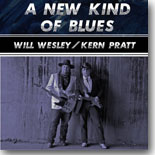 Will Wesley and Kern Pratt haven’t exactly been
sitting on their hands during the recent
pandemic. In fact, they have found inspiration
from recent events. Baton Rouge native Wesley,
who’s previously served as musical director for
Larry Garner, Grady Champion, and T-Bone
Singleton, teamed up with Pratt, who’s recent
album, Greenville, MS…What About You? has made a
lot of noise on the blues charts since the end
of 2019. The pair produced the single “A New Kind Of
Blues” (Endless Blues Records).
Will Wesley and Kern Pratt haven’t exactly been
sitting on their hands during the recent
pandemic. In fact, they have found inspiration
from recent events. Baton Rouge native Wesley,
who’s previously served as musical director for
Larry Garner, Grady Champion, and T-Bone
Singleton, teamed up with Pratt, who’s recent
album, Greenville, MS…What About You? has made a
lot of noise on the blues charts since the end
of 2019. The pair produced the single “A New Kind Of
Blues” (Endless Blues Records).
Wesley sings the first verse on
this track,
plays the first guitar solo, Pratt takes the
second, and they join up for the third and final
verse. It’s a strong track, mixing soul and
blues with a touch of rock in the mix. The song
was co-written by Wesley and Phillip Chandler, who
plays bass, guitar, and organ on the track,
which also features Seth Jones (drums), Adam Marchand (trumpet), James Evans (tenor sax), and
Emily Nelson (backing vocals).
Wesley and Pratt
make a good team and the song topic is one that
we all can relate to, and hopefully put in our
rear view mirror in the near future. Be sure and
check this one out at Apple Music or any of the
usual suspects.
--- Graham Clarke
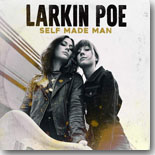 If
you haven't yet hopped on the Larkin Poe
bandwagon, what are you waiting for? If you're
not yet aware of this sister duo originally from
the north Georgia area, with their roots in
bluegrass, they're now often referred to as "the
little sisters of the Allman Brothers." That's a
high level overview of their music, but in many
cases their sound goes much, much deeper than
that. Headed by Rebecca Lovell (lead vocals,
guitar and various other string instruments) and
Megan Lovell (harmony vocals, lapsteel and dobro),
Larkin Poe has shifted its sound from
blues-influenced rock to sometimes playing the
deepest of deep blues and old-time gospel. What
really separates them from the rest are Rebecca's
deep, throaty voice, sounding like she sold out
to the devil to sound this foreboding, and
Megan's haunting slide work on her 1940s era bakelite Rickenbacker lap steel.
If
you haven't yet hopped on the Larkin Poe
bandwagon, what are you waiting for? If you're
not yet aware of this sister duo originally from
the north Georgia area, with their roots in
bluegrass, they're now often referred to as "the
little sisters of the Allman Brothers." That's a
high level overview of their music, but in many
cases their sound goes much, much deeper than
that. Headed by Rebecca Lovell (lead vocals,
guitar and various other string instruments) and
Megan Lovell (harmony vocals, lapsteel and dobro),
Larkin Poe has shifted its sound from
blues-influenced rock to sometimes playing the
deepest of deep blues and old-time gospel. What
really separates them from the rest are Rebecca's
deep, throaty voice, sounding like she sold out
to the devil to sound this foreboding, and
Megan's haunting slide work on her 1940s era bakelite Rickenbacker lap steel.
Larkin Poe's latest album,
Self Made Man (Tricki-Woo Records), has more
of that deep blues & gospel mixed with a
southern rock feel as we heard on recent albums
Peach and Venom & Faith. The title
cut, "She's A Self Made Man," is a good
introduction to what the sisters are doing now,
with shouting vocals and fuzzy, heavy guitar
from Rebecca while Megan takes us into our own
inner darkness with a haunting slide guitar
solo. "Holy Ghost Fire" is equally effective,
with its gospel overtones and call-and-response
chorus, as Rebecca sings, "... burn, baby, burn,
with that holy ghost fire, from your fingers to
the fret ..." and "...with your voices with the
smoke rising higher ..." I'm almost worn out
from the energy of these first two songs, but
secure in the knowledge that my purchase of the
album has already been justified.
The temperature stays elevated
with the Tony Esterly composition, "Keep Diggin',"
with harmony vocals singing, "...if you can't
stand the heat, get out of the kitchen ...," all
the while sitting above Megan's heavy-duty slide
guitar. Southern rocker Tyler Bryant, who
happens to be married to Rebecca, guests on
guitar on his own composition, "Back Down
South," where Rebecca sings about where Little
Richard came from and other various places in
the south. Nice guitar solo from Bryant here.
"Tears Of Blue To Gold" just
might be my favorite cut on the album. It's a
more light-hearted tune that's actually a
welcome respite from the heavier songs. Rebecca
will make you feel like you're hanging out in an
old shotgun house as she sings, "...Tupelo rock
& roll, singing in the kitchen ..." The general
idea is that by making music like this it's
supposed to make you feel better and will turn
your tears of blue to gold. It's effective; I
feel better now. That's good because the next
song, the very gospel-sounding "God Moves On The
Water, tells us about people facing natural
disasters and how they had to run and pray.
Rebecca shows her gentler side
on vocals on "Every Bird That Flies," with
plenty of slide from Megan, discordant guitar
from Rebecca, and a heavy dose of percussion
that kind of resembles Mississippi Hill Country
drumming. That leads into the very fast-moving
"Scorpion," with Rebecca telling someone how
evil they are, just so full of venom. Megan adds
that deep and at times frenetic sound by
dragging the slide across the strings of her
Rickenbacker. Just as foreboding is "Danger
Angel," as Rebecca warns about an evil female
while Megan's slide work feels like a dagger in
your heart.
The tempo slows on "Ex-Con,"
with Rebecca singing about the difficulty
for someone with a record getting transitioned
back into society, repeatedly singing, "...it's
hard living ..." Wrapping up this intense but
great album is another up-tempo Esterly
original, "Easy Street," with a feelgood gospel
vibe. Rebecca sings, "...It won't be long until
I walk on that easy street ...," and then Megan
lays down one of her most incendiary slide
solos.
The music of Larkin Poe is
deeper and darker than it has any right to be.
Perhaps it's embedded in their DNA, as the duo
is named after a 19th century ancestor who was a
distant relative of Edgar Allan Poe. Regardless,
their music takes the listener on a different
avenue through the blues than from most
performers. It's a rewarding trip, albeit with
plenty of dark turns. As much as I like the
Peach and Venom & Fire albums,
Self-Made Man might be their best yet.
--- Bill Mitchell
 We've
run reviews of previous CDs in Blues Bytes by
NYC-based singer / guitarist Kirsten Thien,
but her latest, Two Sides (Screen Door
Records), is my first chance to hear her music,
and it lives up to what I had previously read.
The title refers to the two sides of her music,
her vocal styles, her use of acoustic vs.
electric guitar, etc.
We've
run reviews of previous CDs in Blues Bytes by
NYC-based singer / guitarist Kirsten Thien,
but her latest, Two Sides (Screen Door
Records), is my first chance to hear her music,
and it lives up to what I had previously read.
The title refers to the two sides of her music,
her vocal styles, her use of acoustic vs.
electric guitar, etc.
Thien opens the album with an
acoustic guitar solo leading into "Shoulda
Been," before turning it into a hard drivin'
blues and shouting out the vocals in a strong,
tough voice about all the things she could have
been. Arthur Nielson pops in later with a strong
slide guitar solo. Thien's voice is just as
strong on "After I Left Home," a song she wrote
for Buddy Guy. It's a slow blues with kind of a
John Lee Hooker beat, and Nielson again
contributes a really nice electric guitar solo
before the tune ends very quietly, quite the
contrast from how it started (there's that 'two
sides' thing again).
Another favorite number on this
album is the New Orleans-inspired "Better Or
You're Gonna Get Burned," with the highlight
being the guest appearance by Doug MacLeod on
acoustic and resonator guitars. Thien shows off
her vocal range with spirited, sassy vocals. An
even more interesting cut is a song that she
sings in Spanish, a joint composition by Thien
and Raul Midón called "Montañas." Of course,
there's a nice Latin beat with the addition of
Fabian Almazan (piano) and John Benthal (South
American guitars called cautro and requinto).
Thien issues a call to action on
"Say It Out Loud," with her strong vocals over a
heavy rhumba beat coming from Alex Alexander's
percussion. Two Sides comes to a wrap
with the only cover song, a very nice version of
Leon Russell's "I'd Rather Be Blind."
While this album is a bit short
at only eight songs covering 32 minutes, it's
quality over quantity. Two Sides is a
very nice addition to Kerstin Thien's
discography, and it will have me exploring her
earlier releases.
--- Bill Mitchell
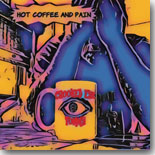 The
California-based blues band with the strange
name, Crooked Eye Tommy, is led by
brothers Tommy and Paddy Marsh, who share guitar
and lead vocal duties throughout their latest
album, Hot Coffee And Pain (Blue Heart
Records). Neither brother is a powerful
vocalist, although they are good enough, and
both play a fine guitar. The rest of the band
(Samuel Corea - bass, Charlie McClure - drums,
Craig Williams - sx, Jimmy Calire - Hammond B3)
are solid, making this band well-equipped to
play the blues.
The
California-based blues band with the strange
name, Crooked Eye Tommy, is led by
brothers Tommy and Paddy Marsh, who share guitar
and lead vocal duties throughout their latest
album, Hot Coffee And Pain (Blue Heart
Records). Neither brother is a powerful
vocalist, although they are good enough, and
both play a fine guitar. The rest of the band
(Samuel Corea - bass, Charlie McClure - drums,
Craig Williams - sx, Jimmy Calire - Hammond B3)
are solid, making this band well-equipped to
play the blues.
They go deep into the Delta for
the opening cut, a version of Son House's "Death
Letter Blues," with Tommy putting out some very
emotional vocals, and there's a nice guitar solo
partway through the song. Paddy steps up to the
vocal mic for the slow, 12-bar blues, "Sitting
In The Driveway." The main character in this
particular tale can't go in the house because he
smells of weed and whiskey, stating that,
"...when my baby sees me, it's going to be a
most uncivil war..."
One of the better numbers here
is the title cut, a mid-tempo ballad with
Williams joining the band on sax and Tommy
handling the vocals quite well. Another keeper
is "Baby Where You Been?," a slow, soulful blues
that brings singer Teresa James to the stage to
share vocals with Tommy.
Perhaps the popular favorite on
Hot Coffee And Pain will be the Marsh
brothers tribute to another set of brothers, the
instrumental "The Big House," a salute to the
Allman Brothers complete with their trademark
dual guitar sound. Bringing the album to a close
is a cover of the Louisiana standard, "Congo
Square," with plenty of solid guitars and horn
work.
Hot Coffee And Pain has
some high points but also some songs that didn't
do much for me. There's potential here, so I'll
be eager to see what's up next for Crooked
Eye Tommy.
--- Bill Mitchell
 The
name Andy Watts is a new one to me, and I
was wondering if I was missing out on someone
about whom I show have known. But then I
realized that he's from Israel and is known as
that country's Ambassador of the Blues, so I get
a pass on this lack of recognition of a very
fine blues guitarist. Judging from his new
VizzTone album, Supergroove, Watts'
sterling reputation is well-deserved. It's
co-produced by Watts and Louisiana blues cat
Kenny Neal, featuring guests from both sides of
the ocean. It's a solid blues album from start
to finish, with absolutely no cuts that made me
say, 'Meh,' and it continued to grow on me the
second time through.
The
name Andy Watts is a new one to me, and I
was wondering if I was missing out on someone
about whom I show have known. But then I
realized that he's from Israel and is known as
that country's Ambassador of the Blues, so I get
a pass on this lack of recognition of a very
fine blues guitarist. Judging from his new
VizzTone album, Supergroove, Watts'
sterling reputation is well-deserved. It's
co-produced by Watts and Louisiana blues cat
Kenny Neal, featuring guests from both sides of
the ocean. It's a solid blues album from start
to finish, with absolutely no cuts that made me
say, 'Meh,' and it continued to grow on me the
second time through.
Among the recognizable guests on
this album are guitarist Joe Louis Walker and
singer Eliza Neals, but the one who really
grabbed me was soulful singer Roy Young, a
native of Jamaica who visited Israel on a tour
and wound up making it his home. His rich, raspy
voice can be heard on three cuts: the Rick
Estrin-penned tune "Living Hand To Mouth,"
Freddie King's "Pack It Up," and a Watts
original slow blues, "Don't Take My Blues Away."
Young's voice was best suited to the latter cut,
made even better by the harmonica accompaniment
of Coastin Hank.
As much as I like Young's
singing, I really got into the vocal work of
Danny Shoshan, who was at times a singer with
seminal Israeli rock band, The Churchills.
Shoshan's smooth vocals are heard on the
up-tempo blues/rock number, "Straight Shooting
Woman," with Watts tearing it up on guitar, and
on the pyschedelic rocker, "Don't You Let Me
Down," originally done in 1972 by a band called
Jericho for which Shoshan was the singer.
Neals takes the mic on the Dan
Penn / Gary Nicholson / Carson Whitsett soul
classic, "Blues Of The Month Club," with Watts
coming in with some powerful guitar chords.
Walker's lone appearance happens on the slow
blues, "Burning Deep," with his voice really
putting out a case of the blues.
The best instrumental closes the
album, a re-constructed version of Peter Green's
"Super Natural." It's a slow, eerie, jazzy blues
with a really tasty trumpet solo from Gregory
Rivkin.
Supergroove is a nice
cross-cultural representation of the blues, with
flavors of rock and soul mixed in. It's perhaps
Step One in making Andy Watts a household name
among blues fans.
--- Bill Mitchell
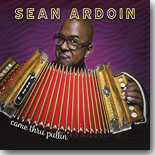 It's
been way too long since a good zydeco album made
its way to my mailbox, but that slump has been
broken with the arrival of Came Thru Pullin'
(Zydekool Records) from Sean Ardoin.
Coming from a long line of notable cajun and
zydeco musicians, Ardoin was previously playing
drums with his brother, Chris, but is now
handling the accordion with his own band. This
is just good, basic zydeco over the 10 cuts,
although with more contemporary influences than
what we were hearing in the genre 30 years ago.
Most cuts are consistently good, nothing
standing out above the others, but it's all
listenable and, of course, very danceable.
It's
been way too long since a good zydeco album made
its way to my mailbox, but that slump has been
broken with the arrival of Came Thru Pullin'
(Zydekool Records) from Sean Ardoin.
Coming from a long line of notable cajun and
zydeco musicians, Ardoin was previously playing
drums with his brother, Chris, but is now
handling the accordion with his own band. This
is just good, basic zydeco over the 10 cuts,
although with more contemporary influences than
what we were hearing in the genre 30 years ago.
Most cuts are consistently good, nothing
standing out above the others, but it's all
listenable and, of course, very danceable.
One number that stands out for
me, primarily because it appealed to my desire
to eat food from Louisiana, is "Gumbo Time."
This one incorporates more current styles of
music and is less of a traditional zydeco tune
with an ongoing rap line of, "... don't mess
that gumbo up, you better know what you're doing
..." Throughout the song Ardoin gives
instructions on how to make a roux and the
appropriate ingredients, like crab and chicken,
to later add to the gumbo.
"Came Thru Pullin'," the title
song, starts with a wall of noise before
breaking into a more traditional zydeco sound,
with strong accordion playing and good vocals.
"Bounce" follows the same zydeco formula, as the
backing musicians are harmonizing on vocals with
Ardoin.
"No That Ain't Right" is more
old-school zydeco, but with more of a blues beat
to it. That leads into the very frantic "Get
Right Girl," more of an R&B sound at the
beginning before Ardoin starts pumping away on
the accordion.
The album's last two cuts,
"Nothing Like Our Love" and "Shut Them Down,"
move further away from traditional zydeco so
they weren't to my personal tastes, but your
results will vary.
Came Thru Pullin' isn't
the best zydeco album in my collection, but I'll
occasionally give it a listen. Let's hope this
is the first of more zydeco releases coming our
way.
--- Bill Mitchell